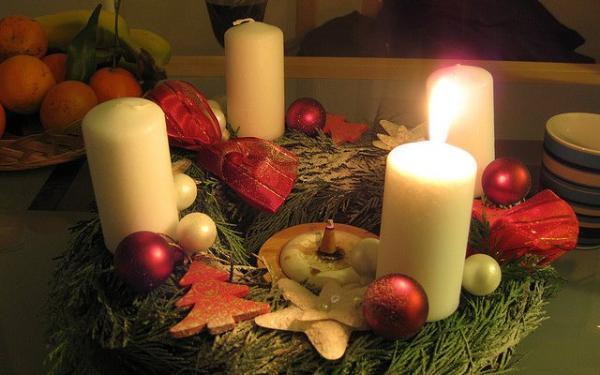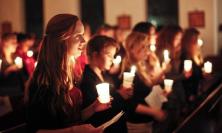Each week during Advent, Thinking Faith will explore the readings for the forthcoming Sunday Mass and reflect on how the words that we will hear can guide us through the season. With the beginning of Advent approaching, Sarah Broscombe finds in the readings for the first Sunday an exhortation to be ready. How can we free ourselves from what might distract us during this important time of waiting?
We encourage you to look at the readings for the First Sunday of Advent alongside this article:
First Reading: Jer 33:14-16
Responsorial Psalm: Ps 24
Second Reading: 1 Thes 3:12-4:2
Gospel: Lk 21:25-28, 34-36
We all come to the First Sunday of Advent with a head, and heart, full of quite particular concerns, and I am no exception. The lens through which I am looking just now is that of a retreat guide. More specifically, I am guiding retreatants who speak a language in which I am not fluent. The curtains that are drawn between languages, in addition to the veils that separate cultures, have made it an experience of seeing through a glass darkly. But perhaps this is true to some extent in any relationship between two people. For me, being a retreat guide always feels like listening to what lies beneath the words: the nearly-said, the would-say-if-I-dared, the belying body language, the sudden change in tempo, the change of breathing.
For many people, being on retreat is a time to reconnect with promises: promises God has made, promises they have made; the desires that have been satisfied and the ones that have not. The foreboding promise in the gospel reading for this first Sunday of Advent (Lk 21:25-28, 34-36) stands in stark contrast to the security and safety of Jeremiah’s promise in the first reading (Jer 33:14-16). So I ask, from the context of an Ignatian retreat, what kind of future, what kind of Advent are these readings inviting us to?
Jeremiah points us forward to a day of fulfilment, a day which is imminent. Because of one life, Judah will be safe, Jerusalem will dwell secure. I notice myself being drawn towards this safety and security; as a guide, I find myself yearning for a dwelling place for my retreatants where they feel that sense of safety. The days that Jeremiah foresees are replete with hope and promise. The exhortation here is, ‘Hope’; hope, because of the One who is coming.
The days that Jesus sees coming, on the other hand, are full of dismay, fear and dread. Who is this terrifying Son of Man whose day ‘will assault everyone’, causing people to die of fright? But as we sit with the words, we see that they are not a threat, but that they, too, are an exhortation. Jesus’s description of the uncertainty and perplexity of what we see in the world around us rings painfully true. We know this terror. I think the terror is as familiar to many of us as the joy that it precedes. The exhortation here is, ‘Be ready’. That lovely state where we are not running to stand still, nor are we losing ourselves in the kind of distractions that make us befuddled, dull and stressed. As with Ignatius’s Meditation on the Two Standards, the point is not to work out which side we are on, to agonise about whether we are sheep or goats. Jesus is talking to his friends, to the ones who have chosen him. We are invited not for judgment, but for redemption. ‘Stand erect and raise your heads, because your redemption is at hand’.
To the outside world, retreat appears to be a withdrawal. The readings for this Sunday remind us that it is anything but. Working with retreatants whose environment is rife with pressures - political, structural and personal - it is particularly clear how dulled our ears and hearts become when fear trickles its way into every corner. Step out of all the accretions, the costumes of our roles, the garb of office or the disguise that protects us, and suddenly we are freer. ‘Stand erect and raise your heads, because your redemption is at hand’. When I do this, physically do this, what happens to my prayer? What happens to my heart? There is a lift, a kind of intake of breath. What is this vigilance? It is a waiting, a steadiness; a hope for the future that, as we live in it, becomes a readiness in the present too.
But I am struck once again on this retreat that this state of readiness and hope is not easy to reach. For many people, when they come on retreat, they are sure that it will be much easier here, without the distractions and the work that needs done. But so many of our distractions have taken root deep inside. I am struck afresh by how much attention we pay to our anxiety, how willingly we nurture and water it. ‘Beware that your hearts do not become drowsy… from carousing… or anxieties’, Jesus says. He does not simply warn against excess of luxury, but against excess of conscientiousness also. I believe this struggle is often connected to a confusion between humility and self-abnegation. In the second week of the Spiritual Exercises, Ignatius warns us about the bad spirit’s personalised skill in disguising itself as an angel of light. The bad spirit loves to beguile and bog down the virtuous with burdens of duty and good works that are impossible to bear. This can be a far more powerful distraction than vice or pride, because it masquerades as God’s work whilst keeping our gaze turned inwards. Too many of us grew up convinced that feeling sorrow for sin equates to self-criticism or even self-loathing. But the humility of the Exercises is a real, useful freedom. It untethers us from disordered attachment to possessions and luxuries, but it also untethers us from unhealthy attachment to our worries and imperfections.
So we find the need to wait. One by one, we loosen the ropes that hold us down. The first few are obvious: the pressures of work or home, the high-maintenance relationships that drain without replenishing, the exhaustions. Then God beckons us forward along new paths and as we walk, the subtler ropes tug. We see the worthy duties that are in fact doing us harm. We see the gifts that others admire which have become millstones or traps for us. The bad spirit appears in masquerade along the path, using anything and everything available to keep our souls turned inward, roped down, self-absorbed. ‘Be vigilant’, Jesus says. Do not get distracted. Keep your gaze steady and watch your redemption approach.
The gospel bids us lift our heads; the psalm (Ps 24) bids us lift our souls. Friendship with the Lord is not something that is easy to cultivate in our busy lives. But ahead is the God of kindness, offering us friendship. I have found myself saying to all of my retreatants here, ‘be kind to yourself’, and several of them kept returning to this phrase, rolling it round the tongue, simultaneously suspicious, attracted and surprised by how hard it is to do.
So how about the days that are coming for you this Advent? What ropes are tugging at you? Where is the balance between trepidation and anticipation? What kind of vigilance will lift you up? For some of us, ‘the days that are coming’ has a more mundane application. Those in parishes have a formidable workload ahead; those who look after families anticipate the build-up to Christmas with complex feelings, or fervent prayers for superhuman energy. But for all of us, today’s readings have one application in common. Lift up your head. Lift up your soul. Be vigilant, because the reward for all of your waiting is just around the corner.
I hear people saying that they don’t bother so much with Christmas anymore, because it just isn’t the same without children around. There isn’t that strength of anticipation, they say. Are adults incapable of this? Perhaps what children are better at is approaching the days that are coming with a belief that anything might happen. They are, of course, right. And whatever public wisdom might say, I’m not convinced that the fervent anticipation of children is primarily about the presents, because often Christmas day itself is a bit of an anticlimax. I think it is deeper than that. Children, just like people on retreat, relish the waiting itself. They are keeping a kind of Advent vigilance. I think that tickle of anticipation, which grows to an itch, which grows to a roar, is the waiting: waiting for Emmanuel, for the life that is possible, for all that could be, for Jesus to come back, for the kingdom of heaven not just then, but now.
Sarah Broscombe works in the charity sector and as a retreat guide. She has worked alongside the Society of Jesus in the UK, Guyana and China.






